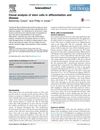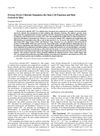 40 citations,
December 2012 in “Epilepsia”
40 citations,
December 2012 in “Epilepsia” Neurosteroids change how GABA_A receptors work in the brain, which could be important for treating temporal lobe epilepsy.
 36 citations,
February 2018 in “British Journal of Dermatology”
36 citations,
February 2018 in “British Journal of Dermatology” Sweat glands and hair follicles are structurally connected within a specific layer of skin fat.
 34 citations,
April 2014 in “Psychopharmacology”
34 citations,
April 2014 in “Psychopharmacology” Stress and alcohol affect brain chemicals differently in rats, mice, and humans, influenced by genetic differences.
 33 citations,
January 2018 in “The Journal of Clinical Endocrinology & Metabolism”
33 citations,
January 2018 in “The Journal of Clinical Endocrinology & Metabolism” Metformin improves menstrual cycles and hormone levels in women with PCOS, mostly within the first 6 months.
 30 citations,
March 2006 in “Dermatologic Surgery”
30 citations,
March 2006 in “Dermatologic Surgery” Finasteride improves surrounding scalp hair and increases hair density after hair transplant.
 25 citations,
March 2000 in “Journal of Endocrinological Investigation”
25 citations,
March 2000 in “Journal of Endocrinological Investigation” Testosterone therapy aims to treat hormone deficiencies and various conditions safely and effectively, but requires careful patient monitoring due to potential side effects.
 23 citations,
October 2005 in “Dermatologic Surgery”
23 citations,
October 2005 in “Dermatologic Surgery” Finasteride improves surrounding scalp hair and increases hair density after hair transplant.
 20 citations,
December 2016 in “Neurodegenerative disease management”
20 citations,
December 2016 in “Neurodegenerative disease management” Teriflunomide effectively reduces relapses and disability in MS and has a manageable safety profile.
 20 citations,
February 2003 in “Facial Plastic Surgery”
20 citations,
February 2003 in “Facial Plastic Surgery” Treat adult facial vascular anomalies with lasers, surgery, or observation, depending on the patient's specific condition.
 17 citations,
September 2019 in “Journal of Cell Biology”
17 citations,
September 2019 in “Journal of Cell Biology” Hair follicle regeneration may slow tumor growth.
 15 citations,
July 2012 in “Biological trace element research”
15 citations,
July 2012 in “Biological trace element research” Higher hair calcium to magnesium ratios and lower chromium levels in hair may indicate insulin resistance in Korean men.
 13 citations,
February 2018 in “Plastic and Reconstructive Surgery”
13 citations,
February 2018 in “Plastic and Reconstructive Surgery” The study found that a specific signaling pathway helps skin wounds heal faster but may lead to larger scars.
 13 citations,
November 2017 in “Journal of Cellular and Molecular Medicine”
13 citations,
November 2017 in “Journal of Cellular and Molecular Medicine” The workshop discussed the role of a protein called calreticulin in health and disease, its potential as a treatment target, and its possible use as a disease marker.
 11 citations,
July 2016 in “Current Opinion in Cell Biology”
11 citations,
July 2016 in “Current Opinion in Cell Biology” New techniques have enhanced our understanding of how stem cells function and the role of mutations in aging tissues, which may influence future cancer therapies.
 10 citations,
September 2022 in “Psychiatry and Clinical Neurosciences”
10 citations,
September 2022 in “Psychiatry and Clinical Neurosciences” Long COVID affects over half of COVID-19 survivors, causing a range of symptoms like fatigue and neurological issues, with no specific treatment yet.
 9 citations,
August 2021 in “Biological Chemistry”
9 citations,
August 2021 in “Biological Chemistry” ECM-inspired wound dressings can help heal chronic wounds by controlling macrophage activity.
 9 citations,
February 2012 in “Cancer Chemotherapy and Pharmacology”
9 citations,
February 2012 in “Cancer Chemotherapy and Pharmacology” The combination of gemcitabine and vinorelbine is effective and safe for treating elderly patients with advanced breast cancer previously treated with anthracyclines and taxanes.
 7 citations,
August 2019 in “Journal of Ovarian Research”
7 citations,
August 2019 in “Journal of Ovarian Research” Blood removal and birth control pills both helped with hormone levels in women with PCOS, but birth control was better for regular periods and blood removal had fewer side effects.
 7 citations,
January 2009 in “Biological & pharmaceutical bulletin”
7 citations,
January 2009 in “Biological & pharmaceutical bulletin” Ferrous Ferric Chloride may improve skin cell function and increase hair growth in mice.
 6 citations,
December 2022 in “International Journal of Molecular Sciences”
6 citations,
December 2022 in “International Journal of Molecular Sciences” Hormone imbalance is linked to Hidradenitis Suppurativa, a skin condition, and treatments like anti-androgenic therapy and metformin can help. It's also suggested to check patients for insulin resistance and Polycystic Ovary Syndrome.
 6 citations,
April 2016 in “Journal of the Formosan Medical Association”
6 citations,
April 2016 in “Journal of the Formosan Medical Association” Metformin improved insulin resistance and BMI in overweight Taiwanese women with PCOS, and a 2-hour insulin test may be a good screening tool.
 6 citations,
January 2010 in “Actas Dermo-Sifiliográficas”
6 citations,
January 2010 in “Actas Dermo-Sifiliográficas” Follicular Unit Hair Transplantation has become a less invasive procedure with natural results, suitable for certain adults with hair loss.
 5 citations,
September 2021 in “Cureus”
5 citations,
September 2021 in “Cureus” Depression in women with Polycystic Ovarian Syndrome (PCOS) is linked to insulin resistance and hyperandrogenism, and managing these can help reduce depression. Lifestyle changes and Cognitive Behavioral Therapy can be effective treatments.
 5 citations,
November 2020 in “EBioMedicine”
5 citations,
November 2020 in “EBioMedicine” Disruptions in sleep-wake cycles can cause health problems like mental, metabolic, and heart diseases, and cancer.
 3 citations,
January 2018 in “Open Access Macedonian Journal of Medical Sciences”
3 citations,
January 2018 in “Open Access Macedonian Journal of Medical Sciences” Implant safely and effectively treats hair loss.
 3 citations,
February 2014 in “Atlas of the Oral and Maxillofacial Surgery Clinics”
3 citations,
February 2014 in “Atlas of the Oral and Maxillofacial Surgery Clinics” New facelift techniques lead to less scarring and faster recovery, with high patient satisfaction after 4 years.
 3 citations,
October 1982 in “Postgraduate Medicine”
3 citations,
October 1982 in “Postgraduate Medicine” Most types of hair loss can regrow naturally, but there are no effective cures for male pattern or age-related hair loss, and only limited options for females.
 2 citations,
July 2021 in “Biochemical and Biophysical Research Communications”
2 citations,
July 2021 in “Biochemical and Biophysical Research Communications” CTHRC1 helps hair grow back, and plantar dermis mixture boosts it.
 2 citations,
January 2021 in “Cureus”
2 citations,
January 2021 in “Cureus” A child's chronic use of Senna caused liver damage and a severe decrease in blood cells, but improved after stopping Senna and getting treatment.
 1 citations,
January 2023 in “Metabolites”
1 citations,
January 2023 in “Metabolites” Changes in gut bacteria can contribute to the development of Polycystic Ovary Syndrome (PCOS), affecting metabolism, immunity, and causing inflammation. Treatments may involve adjusting these factors.






























